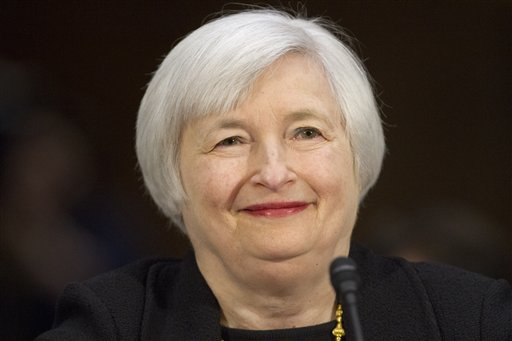WASHINGTON (AP) — Janet Yellen will take the helm of a Federal Reserve facing a significantly different economic landscape from the one that dominated Ben Bernanke’s tenure as chairman, confronting her with different decisions as well.
Videos By Rare
Bernanke’s eight years leading the Fed were largely consumed with the Great Recession and his efforts to cure it by pushing down interest rates and pumping cash into the economy. Many economists think Yellen’s big challenge will be deciding how to ease off some of those very policies, which Bernanke took with Yellen’s support.
“Circumstances may demand more rapid tightening than people are expecting,” said Bill Cheney, chief economist for John Hancock Financial Services, who envisions a growing economy this year. He contrasted that with Bernanke, who he said had to decide “when to step on the gas pedal and how hard” as the economy recovered weakly from the recession.
The Senate confirmed Yellen, a long-time Fed official and economist at the University of California at Berkeley, by a 56-26 vote Monday. Supporting her were all 45 voting Democrats and 11 Republicans, while all opposing votes came from the GOP. Many senators missed the vote because frigid weather canceled numerous airline flights.
Yellen begins her four-year term Feb. 1, when Bernanke steps down. She has been Fed vice chair since 2010.
Nominated by President Barack Obama to the top job in October, Yellen comes to the post after a career in which she has focused in part on unemployment and its causes. Obama and congressional Democrats lauded her concerns for workers Monday.
In a written statement, Obama said Yellen’s approval means “the American people will have a fierce champion who understands that the ultimate goal of economic and financial policymaking is to improve the lives, jobs and standard of living of American workers and their families.”
Many Republicans were less enthusiastic. Sen. Charles Grassley, R-Iowa, warned that a continuation of the Fed’s easy money policies “risks fueling an economic bubble and even hyper-inflation,” which he said could cause “real and lasting damage to our economy.”
House Financial Services Committee Chairman Jeb Hensarling, R-Texas, announced that he will hold hearings on the Fed’s bond buying program and on the “potential unintended consequences” of the Volcker rule. That rule, approved by the Fed and other agencies, is aimed at preventing many large banks from trading for their own profit in hopes of preventing practices that helped lead to the 2008 financial meltdown.
Lobbyists for the banking and financial services sectors issued statements pledging to work with Yellen. Both industries have led a fight to water down restrictions imposed by Obama’s 2010 law overhauling how the nation’s financial system is regulated.
The Fed announced in December that the labor market has improved enough that it will begin reducing its $85 billion in monthly bond purchases, starting with a $10 billion reduction this month. It has pushed that money into the economy to try keeping long-term interest rates low.
But Yellen will face questions about how to manage that process. Moving too fast could spook financial markets and shove interest rates higher, while withdrawing the bonds too slowly could risk creating bubbles — that might burst — in real estate, the stock market or other assets.
The bond purchases have ballooned the Fed’s holdings over $4 trillion. That leaves Yellen with decisions about how to wind down the central bank’s balance sheet to a smaller, more normal level without destabilizing financial markets used to the huge cash infusions.
Yellen also will have to decide when and how to ease off short-term interest rates, which the Fed has kept near zero since December 2008. To assure investors that those rates won’t precipitously rise, the Fed has repeatedly issued statements saying that policy will continue.
Last month, the Fed said the low rates will continue “well past” when the unemployment rates falls to 6.5 percent. Unemployment was 7 percent in November and many economists think the low interest rates will last until late 2015.
Yellen will also guide the Fed at a time when some Republicans say the central bank needs to be more accountable to Congress. Hensarling has already said his committee will spend a year reviewing Fed operations.
Last week, Bernanke voiced concerns about legislation giving the Government Accountability Office, Congress’ auditing arm, more power to examine how the Fed makes interest rate decisions. Bernanke said such legislation would make it harder to assure markets that its decisions aren’t influenced by political pressure.

